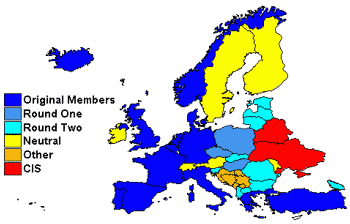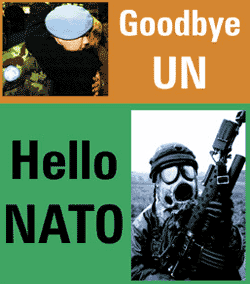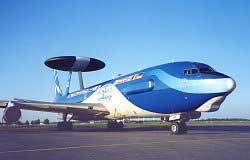|
"NATO - Coming to
a war near you..."
 |
| NATO Countries
in addition to the U.S. |
Though it may be suspected they did
not appreciate it at the time, heads of state attending
the November 2002 NATO Summit in Prague effectively
signed up to the Alliance's world - and those of their
defense forces - being turned upside down. No longer is
the Alliance to wait for the threat to come to it - now,
in the words of NATO Secretary General Lord Robertson,
its aim will be to "deal with threats from wherever they
may come".
This transformation has many implications, but for NATO
nations' defense forces it means that all of them, not
just some, will have to be prepared to 'go places and do
things' on an unrestricted, global canvas. Militarily,
these forces will have to be able to fulfill a range of
new tasks in conjunction with a range of non-traditional
allies or partners. As a result of the summit, parent
national administrations have not only accepted that
their forces should in principle become involved in
global missions, but also that in practice they should
be equipped and most particularly should train
accordingly.
 This
may have been universally assented to in Prague, but in
numerous farewell addresses before his successor took
over at the end of 2003, Lord Robertson felt driven to
highlight the political and materiel changes still
required of individual nations for their professed
commitments to progress beyond mere lip service. This
may have been universally assented to in Prague, but in
numerous farewell addresses before his successor took
over at the end of 2003, Lord Robertson felt driven to
highlight the political and materiel changes still
required of individual nations for their professed
commitments to progress beyond mere lip service.
Typically, at the Welt am Sonntag forum in Germany in
early November 2003, he pointedly told delegates, "The
non-US NATO countries have lots of soldiers, but far too
few of them can be deployed." Putting it more bluntly,
he said, "The overwhelming part of [these] 1.4 million
soldiers are useless for the kind of missions we are
mounting today.
"The reasons are many and various. Some countries have
legal or constitutional constraints on where they are
able to deploy their forces, especially if they are
conscripts. Other countries do not have the capabilities
required to deploy them abroad and supply them where
they are. Others again say they cannot afford to do so.
Or their governments lack the political leadership to
argue the case for doing so with parliaments and
publics.
 "The
harsh unavoidable truth is that if our governments are
to continue to take on political commitments to do more
militarily, in Afghanistan or in Africa or anywhere
else, then they must improve the usability of their
armed forces." "The
harsh unavoidable truth is that if our governments are
to continue to take on political commitments to do more
militarily, in Afghanistan or in Africa or anywhere
else, then they must improve the usability of their
armed forces."
Aside from its adoption of a global role, the Prague
outcomes included an agreement that NATO should be
further enlarged, another seven nations (Bulgaria,
Estonia, Latvia, Lithuania, Romania, Slovakia, Slovenia)
joining the existing 19 with effect from May 2004; that
it should have a role in combating terrorism and weapons
of mass destruction; and that it should 'transform'. The
justifications were to ensure the Alliance retained its
relevance in a fast-moving world; to enable it to handle
new technologies and threats; and to rectify capability
gaps (mainly those between the US and the other NATO
partners). |